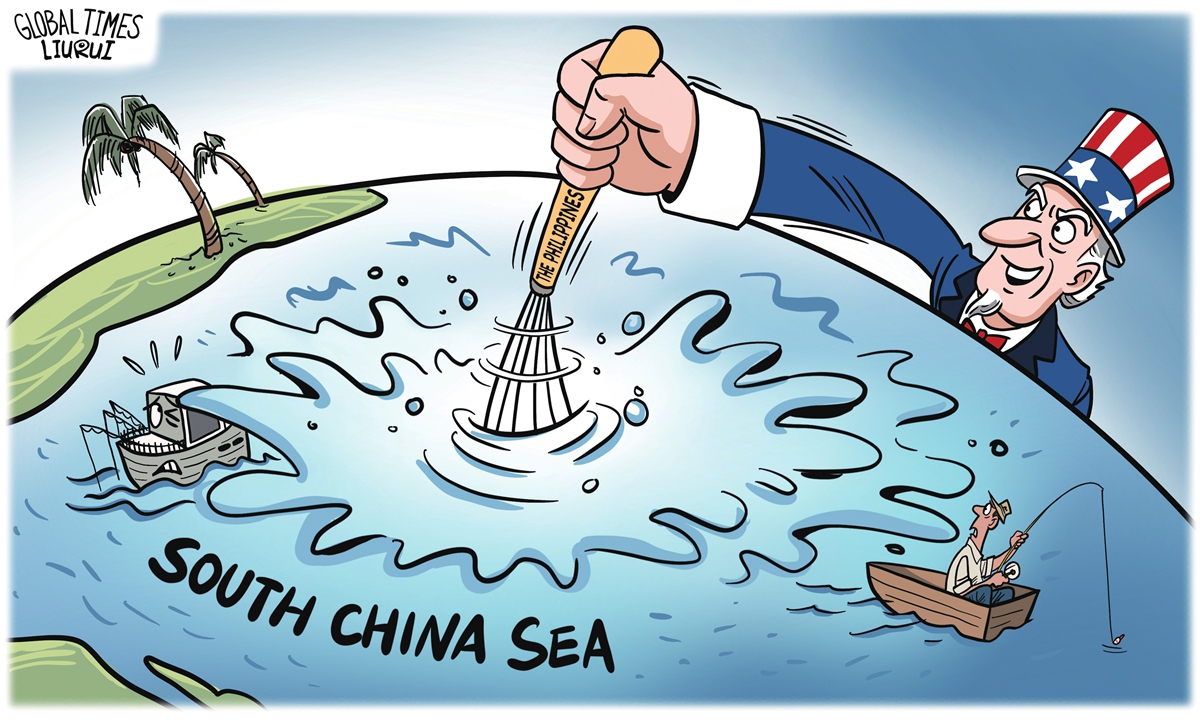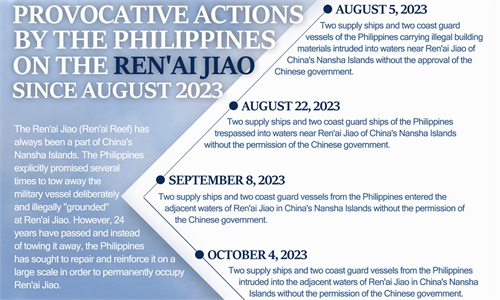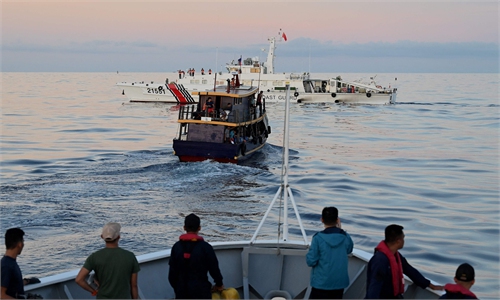
Illustration: Liu Rui/GT
Despite the recent easing of tensions in the South China Sea, the Philippines once again provoked China by airdropping supplies to its illegally grounded warship on Ren'ai Jiao (also known as Ren'ai Reef) and sensationalizing the trespass of Philippine fishermen on Huangyan Dao (also known as Huangyan Island).The trespassing incident and the hype by the Philippine side occurred earlier this month. Reports show that on January 22, the spokesperson of the Philippines' National Security Council accused the China Coast Guard (CCG) of carrying out "provocative action" against Filipino fishermen. However, the truth is that on January 12, a group of Philippine fishermen trespassed into the reefs of China's Huangyan Dao to illegally catch seashells. The CCG took necessary measures to stop these actions in accordance with the law, and their on-site operations were professional, reasonable and legitimate, according to a reliable source.
In 2023, the Philippines consistently provoked China in multiple maritime areas, including Huangyan Dao and Ren'ai Jiao. These provocations involved the transportation of supplies and intrusions into fishing territories.
The provocative actions of the Philippines in the South China Sea, amid the backdrop of the vast power gap between China and the Philippines, adjustments in the US Indo-Pacific Strategy and the strategic competition with China, have become intriguing.
It is the Philippines that has consistently provoked China on the South China Sea issue in the first place. The Philippine and Western media outlets, however, have been crafting an international image of China "bullying" the Philippines. Whenever an incident occurs in the South China Sea, the Philippines makes a scene and manipulates its domestic media to incite anti-China sentiments within the Philippines.
In addition, the hype of the Philippines is amplified on internet platforms across the world by some overseas social media accounts and Western media outlets, specifically to discredit China's protection of maritime rights and challenge China's sovereignty over the South China Sea. The Philippines' provocative behavior is related to the support it receives from the US. The US has set up SeaLight, a maritime transparency project led by retired US Air Force Colonel Raymond M. Powell, with an aim of smearing China.
The persistent provocations at sea, coupled with the public opinion war on the internet, as well as diplomatic maneuvers, constitute a new feature of the China-Philippines maritime game under the Marcos Jr. administration. It is the Philippines' highly offensive operations in the South China Sea that are causing unprecedented severe challenges to China-Philippines relationship since the establishment of diplomatic relations between the two countries. It is the Philippines that is responsible, not China, for the deterioration of China-Philippine relations.
Rational foreign policy must be based on an accurate calculation of national interests and national strength. As a relatively small country in this region, the Philippines must be careful and prudent amid the competition of big powers, or it may become a victim.
According to the Chinese Ministry of Foreign Affairs, the Eighth Meeting of the China-Philippines Bilateral Consultation Mechanism on the South China Sea was held in Shanghai on January 17. The two sides agreed to unswervingly deliver on the important common understandings reached between the two heads of state on maritime issues, and continue to properly manage maritime disputes and differences through friendly consultation. They stressed that maintaining communication and dialogue is essential to maintaining maritime peace and stability. The two sides also reached a consensus on further improving the maritime communication mechanism and agreed to constantly promote practical maritime cooperation. We welcome more moves by China and the Philippines to meet each other halfway. We also hope that the Philippines will demonstrate sufficient strategic wisdom to develop a future-oriented China-Philippines relationship.
The author is director of the Center for Philippine Studies at Jinan University. opinion@globaltimes.com.cn


